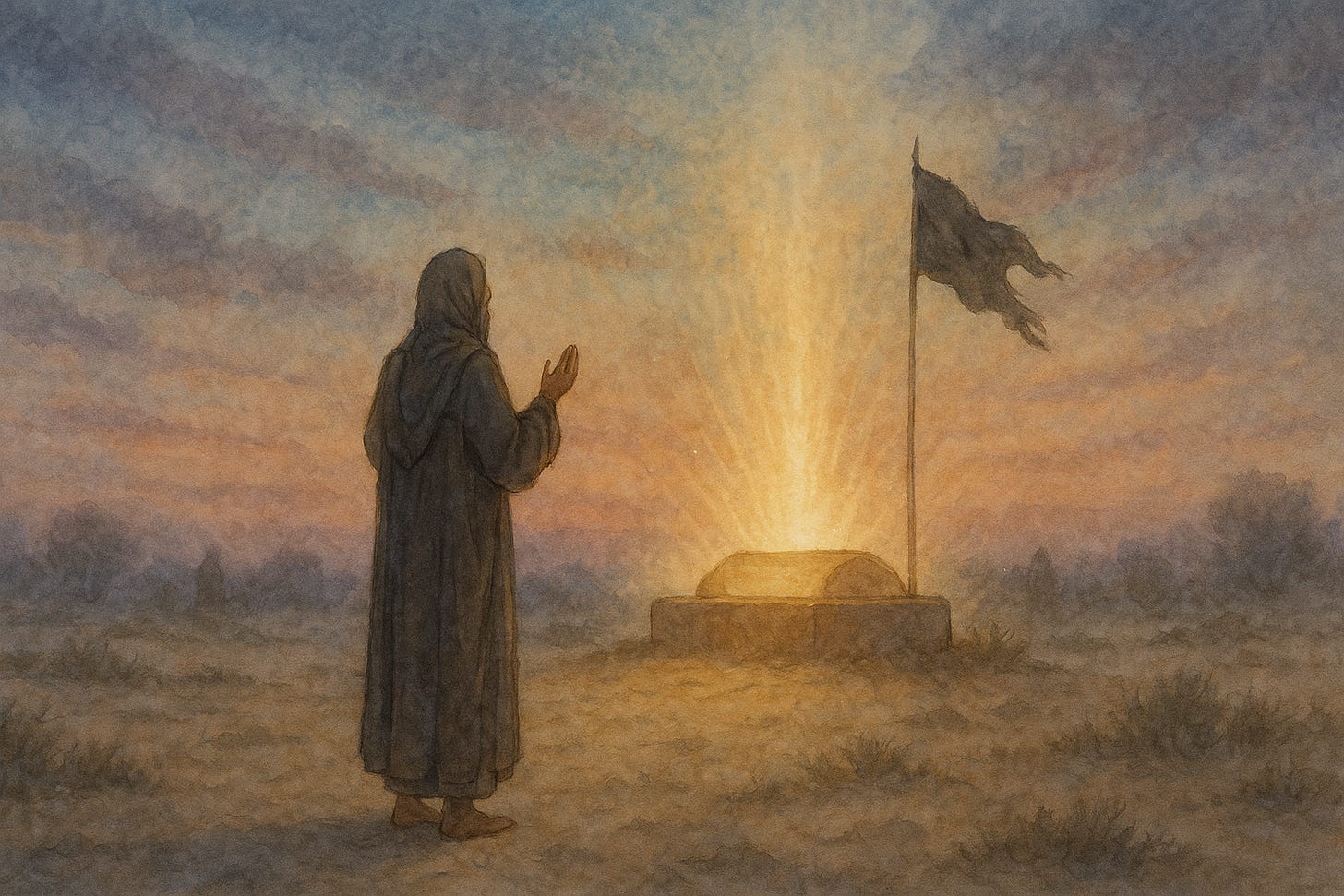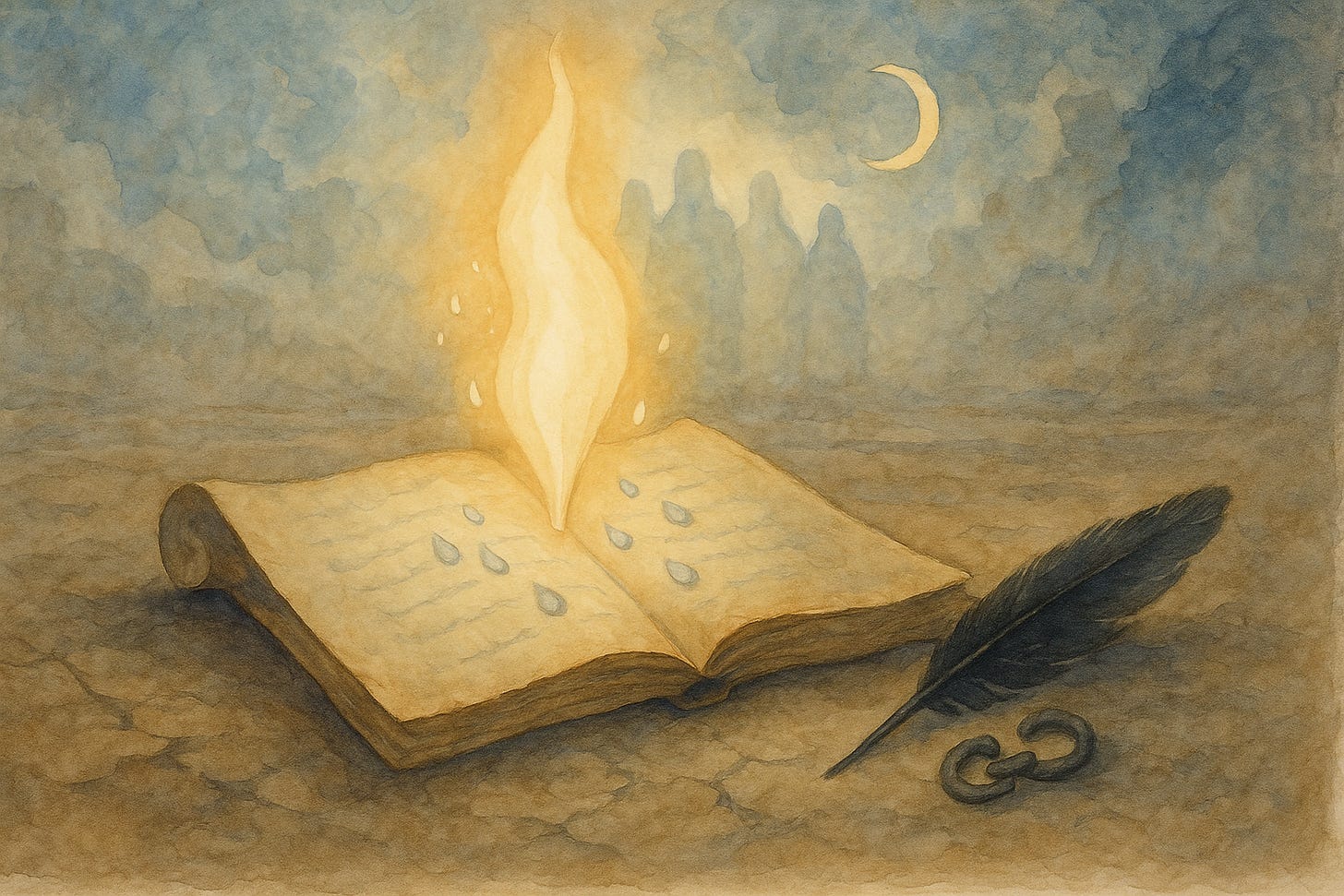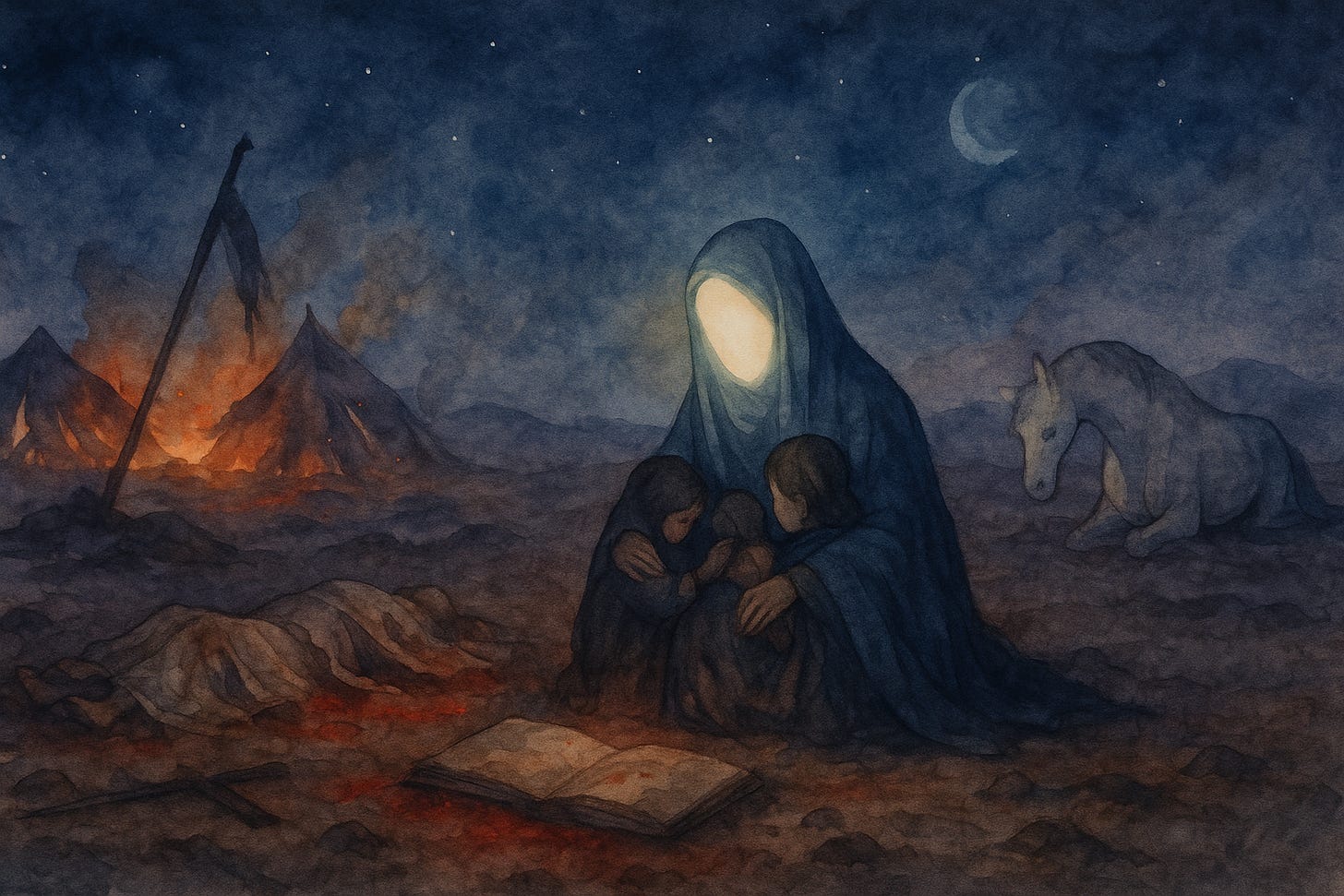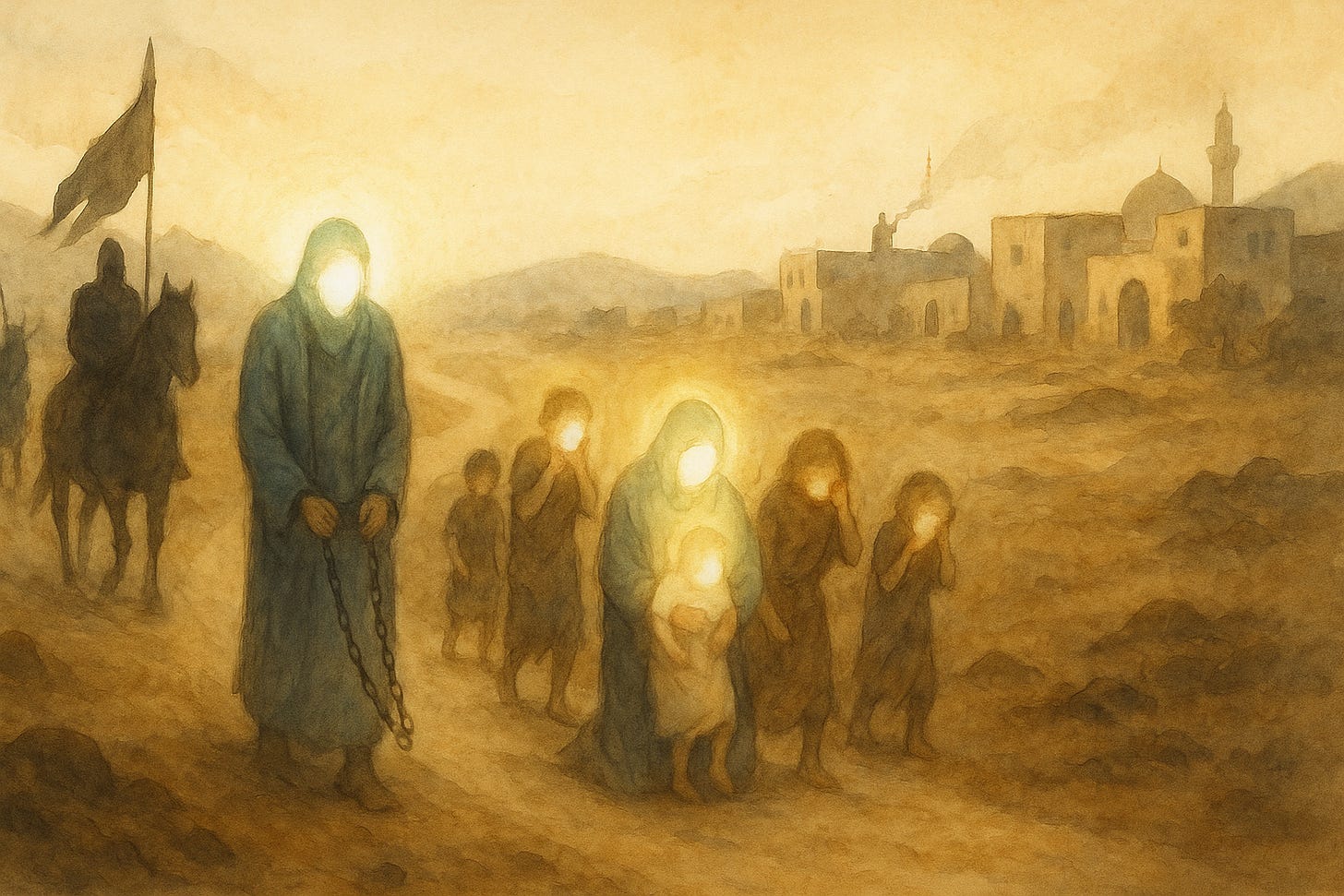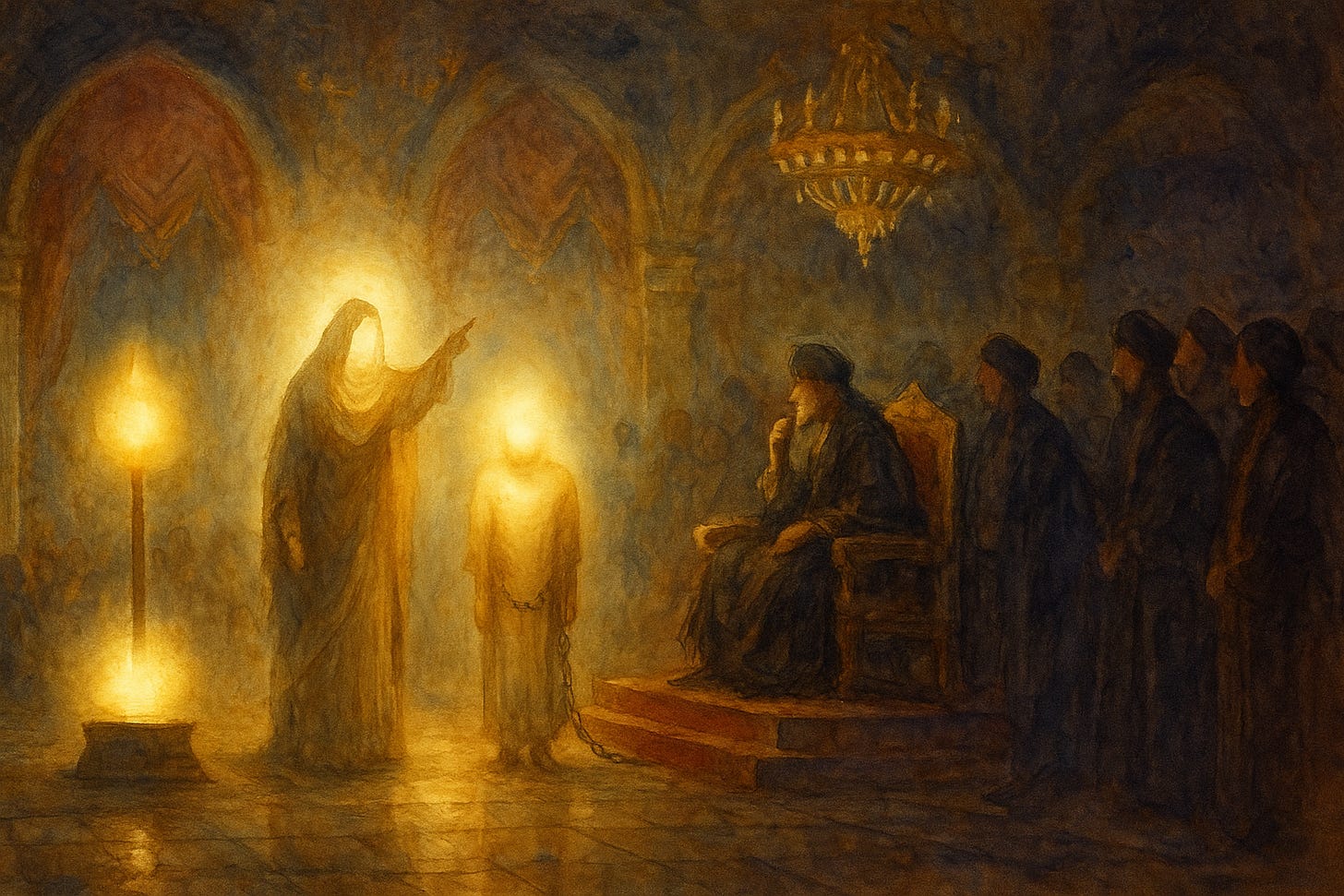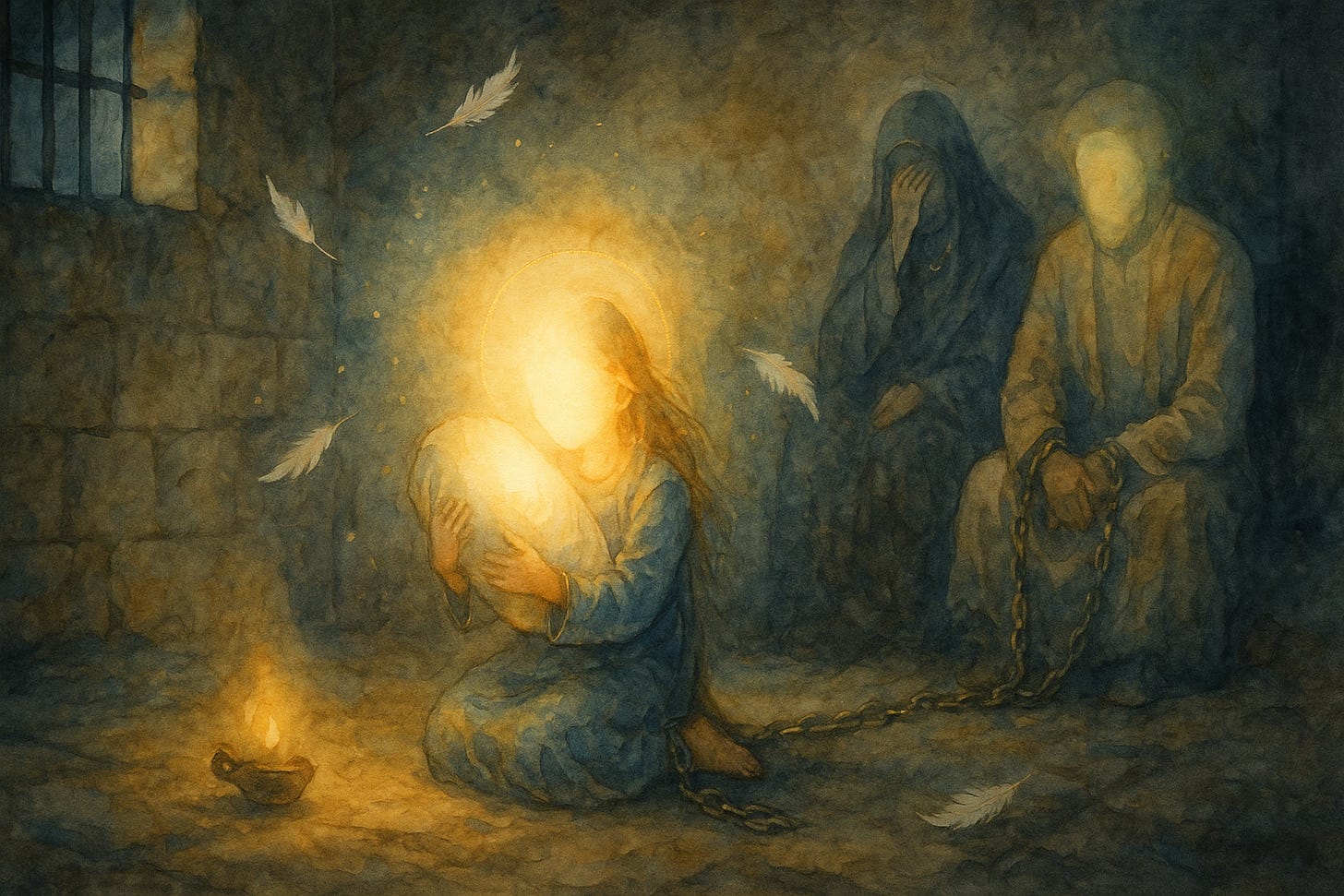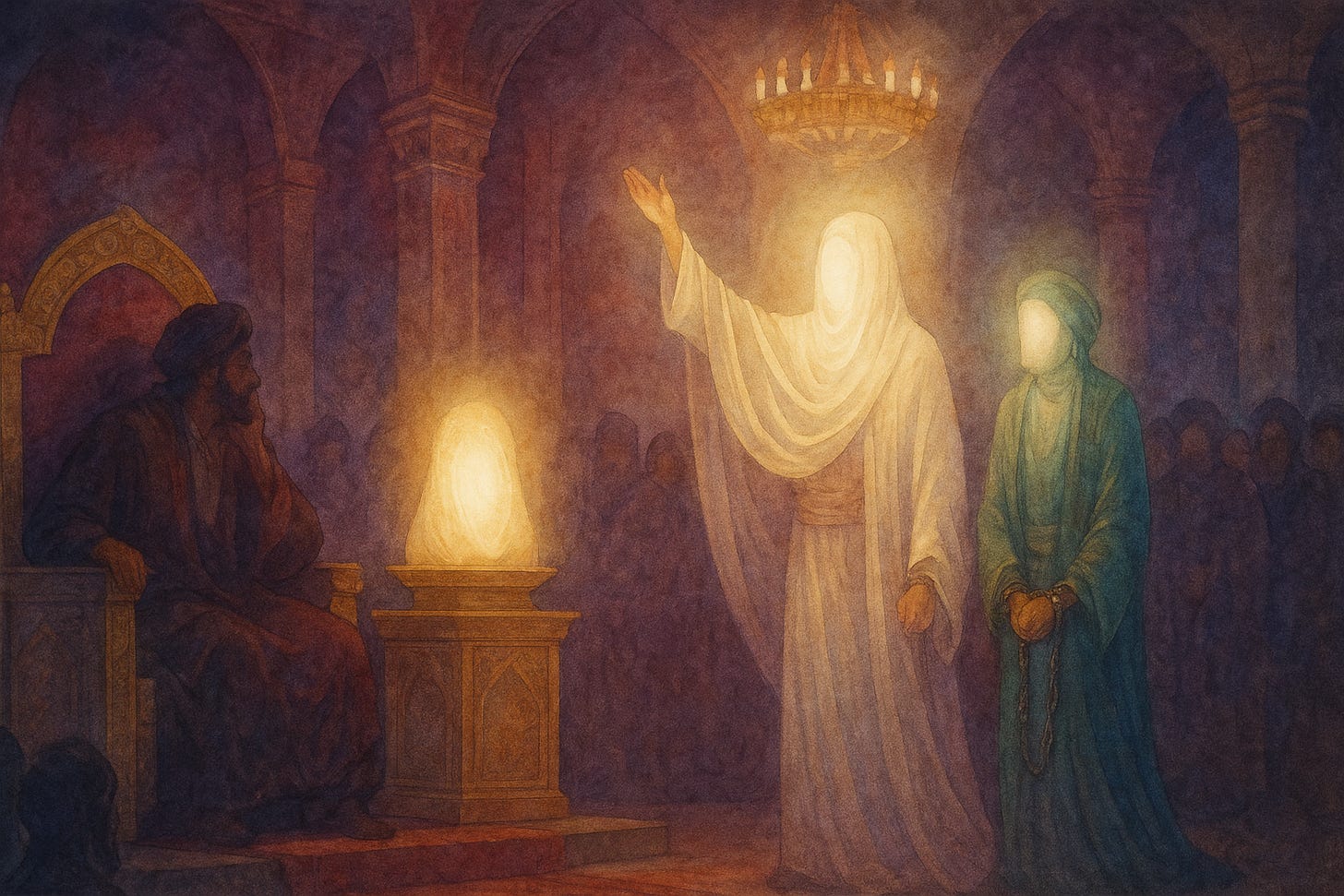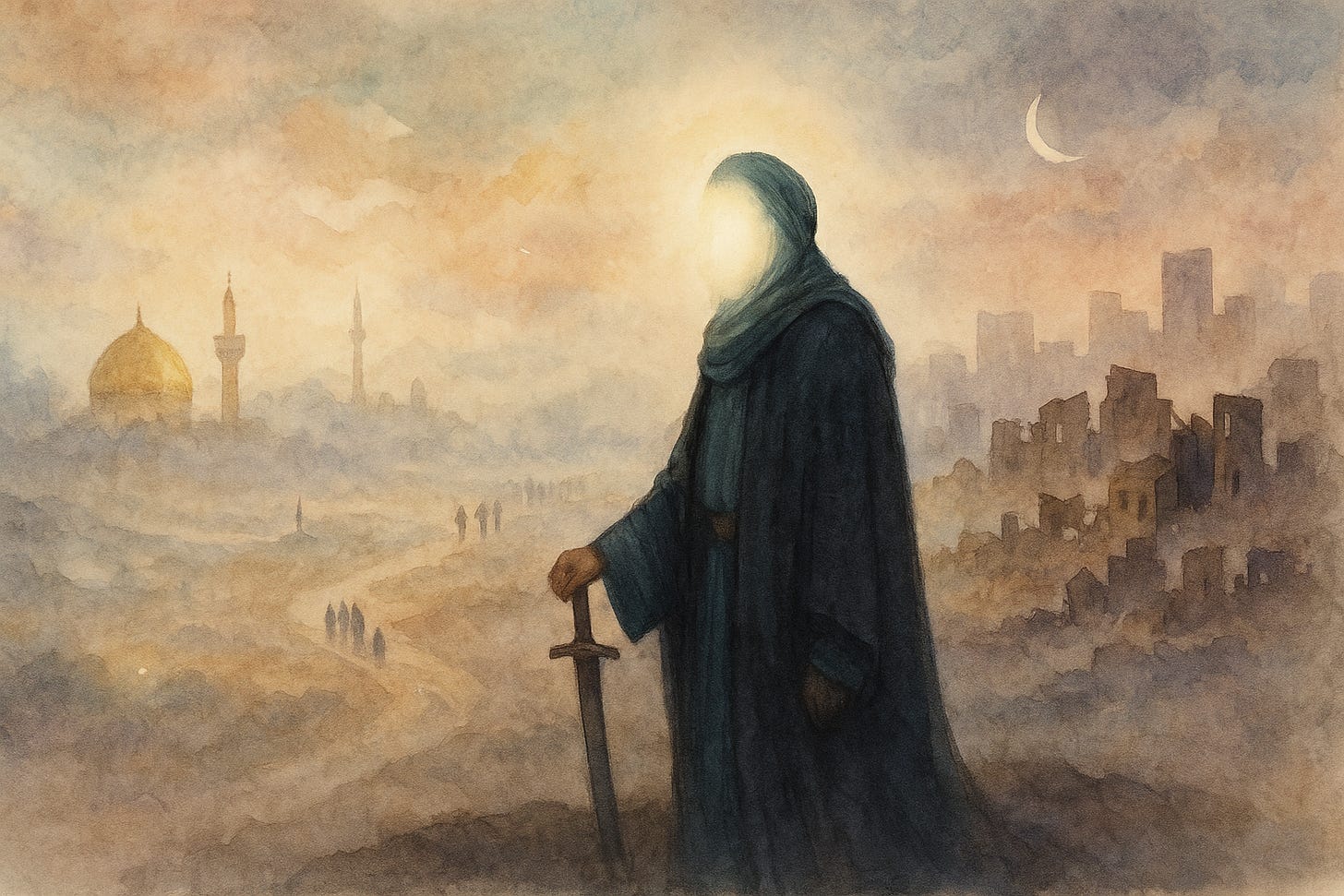The Arbaeen Maqtal: The Victory of Blood, The Legacy of Clarification
This is a maqatil (martyrdom narrative - devotional recitations recounting the suffering and sacrifice of the Ahl al-Bayt, the family of Prophet Muhammad). This is for Arbaeen 2025/1447
In His Name, the Most High
اَلسَّلَامُ عَلَيْكَ يَا بْنَ رَسُولِ اللَّهِ
اَلسَّلَامُ عَلَيْكَ يَا بْنَ سَيِّدِ الْأَوْصِيَاءِ
نَشْهَدُ أَنَّكَ أَمِينُ اللَّهِ وَابْنُ أَمِينِهِ
عِشْتَ سَعِيداً وَمَضَيْتَ حَمِيداً وَمُتَّ فَقِيداً مَظْلُوماً شَهِيداً
وَنَشْهَدُ أَنَّ اللَّهَ مُنْجِزٌ مَا وَعَدَكَ
وَمُهْلِكٌ مَنْ خَذَلَكَ وَمُعَذِّبٌ مَنْ قَتَلَكَ
وَنَشْهَدُ أَنَّكَ وَفَيْتَ بِعَهْدِ اللَّهِ
وَجَاهَدْتَ فِي سَبِيلِهِ حَتَّى أَتَاكَ الْيَقِينُ
فَلَعَنَ اللَّهُ مَنْ قَتَلَكَ وَظَلَمَكَ
وَلَعَنَ اللَّهُ أُمَّةً سَمِعَتْ بِذَلِكَ فَرَضِيَتْ بِهِ
اللَّهُمَّ إِنَّا نُشْهِدُكَ أَنَّا أَوْلِيَاءُ لِمَنْ وَلاَكَ
وَأَعْدَاءُ لِمَنْ عَادَاكَ
بِآبَائِنَا وَأُمَّهَاتِنَا يَا بْنَ رَسُولِ اللَّهِPeace be upon you, O son of the Messenger of God.
Peace be upon you, O son of the Master of the Successors.We bear witness that you are the trustee of God and the son of His trustee.
You lived a blessed life, departed praiseworthy, and died a martyr, deprived and wronged.
And we bear witness that God will fulfil what He promised you,
and will destroy those who abandoned you, and punish those who killed you.
And we bear witness that you fulfilled the covenant of God,
and strove in His way until certainty came to you.So may God’s mercy be away from those who killed you and wronged you,
and may God’s mercy be away from the people that heard of this and was pleased with it.O God, we make You our witness that we are friends to those who befriend you,
and enemies to those who are hostile to you.
May our fathers and mothers be sacrificed for you, O son of the Messenger of God.— Adapted from Ziyarat Arbaeen1
Video of the Maqtal (Eulogy)
Audio of the Maqtal (Eulogy)
Introduction
Arbaeen2 is commemorated forty days after Ashura—the day on which Imam Husayn, the beloved grandson of the Prophet Muhammad (peace and blessings be upon him and his family), was brutally massacred upon the plains of Karbala at the hands of the forces of Yazid ibn Muawiyyah, the tyrannical Umayyad caliph. This atrocity occurred in the year 61 AH—barely fifty years after the passing of the Prophet.
What follows is a maqtal—a sacred eulogy and historical recounting—dedicated to the remembrance of Imam Husayn, Sayyedah Zaynab, Imam Zayn al-Abedeen, and the purified family of the Imam: the captives (sabaya) of Karbala. These noble souls, after the tragedy of Ashura, were taken in chains—abused, humiliated, and paraded as spoils—first from Karbala to Kufa, and then from Kufa to Damascus.
Amidst these trials, Sayyedah Zaynab, the sister of Imam Husayn, and Imam Zayn al-Abedeen, his son, rose as luminous beacons of truth. From village to town, from city to court, they continued the mission of tabyeen—clarification and exposition—educating the people, unveiling the injustice that had befallen them, and explaining why Imam Husayn had risen, why he had been martyred, and what divine truth was being defended. Through their sermons and silent dignity, the hujjah—the proof—was completed upon the masses.
This campaign of tabyeen was a triumph greater than swords, for it destabilised the very foundations of the corrupt Umayyad regime. In desperation, Yazid’s tyranny escalated: he ordered the attack on Madinah—the City of the Prophet—and later launched an assault on the Kaʿbah itself in Makkah.
Thus, the truth of the Umayyad regime was laid bare—its satanic nature exposed. It stood in complete opposition to the divine system of governance established by the Prophet Muhammad: a system rooted in justice, mercy, and divine guidance.
The historical narrative in this maqtal has been drawn from numerous authoritative sources, including:
As well as from sacred devotional texts, such as:
What is a Maqtal
A maqtal, at its heart, is a sacred eulogy—a solemn remembrance of the epic tragedy of Ashura and the subsequent trials that culminated in Arbaeen. It is more than a historical narration; it is a spiritual unveiling of the martyrdoms and sufferings of the Prophets and Imams, particularly that of Imam Husayn and his purified family, the Ahl al-Bayt.
To recite a maqtal is not merely to recount events of the past. It is to invite the listener into a living covenant with Imam Husayn, with the Prophets of God, and with the divine legacy of truth and resistance they carried. Through their words, their tears, their sacrifices—our conscience is stirred, our soul awakened, and our hearts made ready for transformation.
The purpose of this narration is not just to inform, but to educate, to pierce the veils of heedlessness, and to etch the message of divine courage into the very soul of the believer. It is natural—indeed, it is blessed—to weep during the maqtal. For when one truly contemplates the magnitude of what befell the family of the Prophet, and realises that the tragedy of Karbala was not just a blow to the Ahl al-Bayt or to the legacy of Prophet Muhammad (peace and blessings be upon him and his family), but to the very spirit of Islam and truth itself—then the heart can do nothing but break in sorrow.
Yet this sorrow is not the end—it is the beginning. The maqtal is not a performance of grief, but a call to rise. Every tear shed is a covenant. Every broken heart is a vessel for divine resolve. The true tribute to Imam Husayn, to Sayyedah Zaynab, to the Prophets and the righteous martyrs of every age, is that we do not allow their sacrifice to fade into memory. We must allow it to shape us—so that every mourning heart becomes a fortress against tyranny, and every remembrance becomes a step toward the promised justice of God.
The Arbaeen Maqtal: The Victory of Blood, The Legacy of Clarification
The Silence of the Night
Ashura, Muharram 10, 61AH - Karbala, the Night after the Massacre
In the Name of the One whose Throne trembled when Husayn fell…
The One who buried the Quran beneath spears, so the world would remember it in chains.Where were you?
Where were you when the night descended,
and the smoke of looted tents replaced the clouds?
When the winds, heavy with blood,
could no longer carry the cries of orphans to heaven?The battlefield lay still — but not silent.
For the earth itself was sobbing.There were bodies.
And the bodies had no shrouds.
And the shrouds had been torn.
And the torn cloth had been stolen — even from the slain.Zaynab sat beneath the sky that had once shaded the Prophet.
She sat beside the severed limbs of her brothers,
gathering children whose cries were hoarse with thirst.I was not there —
but I remember.I remember the moan of Ruqayyah in her sleep.
I remember the stillness of Abbas’ arms.
I remember the headless torso that still glowed, even in death.I was not there —
but I inherited that night like a sword passed through time.You, who claim to walk for Husayn,
have you walked through fire?Have you spent the night beside burned tents,
listening to widows cough in the smoke
and a dying horse kneel beside a body no longer its master?The tents of Muhammad were looted.
And the Quran was stained.
And not a single grave was dug.And I — the one they wait for —
waited.Behind the veils of ghaybah, I cried for the unveiled.
Behind the curtain of time, I wept with the timeless.
And the sky, that had once split at the call of ‘Iqra,’
now split again —
not in light,
but in grief.
The Chain and the Spear
Muharram 11, 61 AH – The Captives are Taken from Karbala to Kufa
They tied iron to what the angels would not touch.
They chained the wrists of Sajjad —
wrists that still trembled with fever,
wrists that once held the Quran as a child holds the sky.They led him like a criminal
through the dust where his father fell.
The dust still wet with blood,
still sacred —
but not to them.Behind him followed the orphans,
and behind them —
Zaynab.O my aunt…
O mountain veiled in fire…
how did you carry them?You, who had just washed your brother’s blood from your own hands —
now dragged through the desert as a spoil of war.Their spears bore heads.
Their spears bore joy.
Their spears bore Islam’s most honoured flesh —
as trophies.They marched through the ruins of prophecy.
The river looked away.
The palm trees wept in silence.
No Quran was recited —
for the Quran was bleeding,
and the reciters had joined the murderers.A child asked,
“Will they take us to our grandfather’s city now?”Zaynab said nothing.
She only adjusted her torn chador
and held her silence like a sword.O my Shia…
when you carry banners on Arbaeen,
do you carry this day?When you place your feet on the road from Najaf to Karbala,
do you feel the road from Karbala to Kufa beneath your heels?For on that road,
Islam was dragged in chains.And you weep for Husayn —
but do you march for Sajjad?Do you walk for the ones who walked that path in shackles,
without water,
without shoes,
without a single soul in the crowd to shout “Labbayk”?The wind called their names,
but the people shut their windows.Only the sky bore witness —
and I,
the son of the one they slaughtered,
I too walked beside them — unseen,
but vowing never to forget.
The Wolf of Kufa
Muharram 12, 61 AH – The Sabaya17 are brought into the Palace of Ibn Ziyad in Kufa
They brought the sabaya into Kufa not as guests,
nor even as prisoners —
but as a spectacle.They were made to wait at the gate,
while the crowd assembled to gawk and gloat.
Children threw stones.
Old men spat.
Women who had written letters of loyalty
now whispered insults from behind veils of shame.They did not see the family of the Prophet.
They saw the vanquished.Inside the palace,
the blood still stained the spears,
but already the court had returned to laughter.Ibn Ziyad reclined like a jackal at ease —
soft pillows beneath the feet that had trampled the Quran.
The severed head of Husayn sat in a dish before him.
He poked its lips with his staff.Zaynab was veiled in dust and fire.
Her robe torn, her body weary —
but her stance was thunder.And when he mocked her lineage,
she did not flinch.“Do you mock us because God granted us a test?”
“O son of the freed ones! You have not cut us down — you have only exposed yourself.”He struck the staff again,
and turned to the youth in chains.“Who are you?” he snarled.
And the boy — the sick one,
the one whose body had failed him,
but whose soul was the flame of Wilayah —
raised his chin.“I am Ali, son of Husayn, son of Ali, son of Abu Talib.”
“I am the son of the one they slaughtered beside the river you now drink from.”
“I am the son of the one you abandoned with your tongues,
then betrayed with your swords.”A silence fell.
Even the spears seemed ashamed.
The tyrant clenched his teeth —
but did not strike.Because in that moment,
he knew he had been exposed.O my people…
What sermons do you recite when the pulpit is safe?
What khutbahs do you deliver when the tyrant is dead?But Zaynab stood before the wolf
while his teeth still glistened with blood.
And Sajjad spoke while chains bit into his flesh.That —
that is tabyeen.And you?
You wait for the Imam of your time
to return with angels and swords.
But have you spoken while the blade was raised?Have you clarified truth while it was still unpopular?
While it cost you comfort?
Or dignity?O Kufa…
You wore the cloak of Islam
but forgot the Prophet’s scent.And O Shia…
what cloak do you wear now?
The Road of Scars
Mid–Late Muharram, 61 AH – The Captives are Marched from Kufa to Damascus
They did not take them by the shortest path.
No — they paraded them.
From village to village, market to market.
The family of the Prophet —
shown off like trophies, like criminals,
like beasts captured from a rebellion.The roads from Kufa to Damascus twisted like a whip.
And every lash left a scar.Sajjad walked with chains that bruised the bone.
Zaynab walked with memories that would never fade.
The children walked barefoot,
through towns that threw stones instead of bread.In some cities, they were cursed.
In others — pitied.
And in a few…
a veil was lifted.An old woman fainted when she saw the head of Husayn,
recognising the Prophet’s face in its profile.
A Christian monk lit incense and offered prayers.But these moments were rare.
And quickly silenced.The sun beat down upon the sabaya —
but not as harshly as the eyes of those
who knew,
but remained silent.O people of the minarets…
O lovers of recitation…
did you not hear the Quran
being recited from the lips on the spear?A child fell in the dust.
She had not eaten for three days.
A soldier kicked her forward.
Zaynab shielded her —
with arms already purple from bruises.No water.
No shade.
No dignity.They passed through Raqqa, Mosul, Aleppo.
Cities that would later boast their allegiance —
but at the time,
not a single stone was thrown at the oppressors.And I —
I walked behind them.
Behind the one whose tears soaked the chains.
Behind the one whose sermon pierced the palace.
Behind the orphans who would never again laugh.I counted every step.
Every groan.
Every scar.And I have not forgotten.
O walkers of Arbaeen…
do you walk in honour of Zaynab’s march?
Or have you turned her chains into garlands,
her bruises into banners?Do you know the route she took?
The dust she swallowed?
The humiliation she bore?Or have you made your walk a ritual —
but left your loyalty behind?
The Court of the Tyrant
Early Safar, 61 AH – The Sabaya18 are Brought into Yazid’s Palace in Damascus
The palace rose like a scar in the heart of Damascus.
Pillars carved by wealth stolen from widows,
walls draped in silk
while orphans wept in the alleys outside.And into this palace —
they brought the sabaya.They entered through a gate too low to carry dignity.
The heads of the martyrs went first.
Raised on spears,
shadows falling upon the marble like curses.The women followed.
Bareheaded.
Bruised.
Veils torn by soldiers, not by time.And then —
the boy.
Ali, son of Husayn.
His back bent not by age,
but by chains.Yazid sat atop a throne
built from the ashes of the Prophet’s city.
He wore black as mockery.
He smiled as theatre.
He turned to the severed head before him and poked its lips
with a staff made from cane.The courtiers laughed.
The crowd clapped.
And the angels
recorded every breath.Zaynab rose.
Her body weary, her robe tattered,
but her eyes —
those were the eyes of Hayder.And the court stilled.
“O Yazid! Do you think this victory is yours?”
You have only bared your teeth to the world — not your strength.
You have spilled the blood of the Prophet’s family — but not silenced the cause.
I see nothing today but the disgrace of falsehood — and the triumph of truth.”Her words shook the chandeliers.
And Yazid, drunk on illusion, turned to Sajjad.“Boy — speak if you dare.”
And speak he did.
“I am the son of Makkah and Mina.
I am the son of the one struck by revelation in the Cave of Hira.
I am the son of Fatimah al-Zahra —
the master of all women of the worlds.”“You ask who I am, O Yazid?
I am the grandson of the one whose name you invoke in your false adhan —
yet whose family you paraded in chains.”The tyrant did not speak again that day.
O people of sorrow…
you gather in Damascus to visit Sayyedah Zaynab,
but do you speak when Yazid lives again?When he changes flags but not intentions?
Do you cry in her courtyard
while silent in your own?And O you who claim to love the Ahl al-Bayt —
they stood in courts that wanted them dead.
And you hesitate in rooms that only want you uncomfortable?This —
this is the measure of loyalty.This is tabyeen.
Ruqayyah’s Dream
Safar 5, 61 AH – Shaam19, the Prison of the Captives
She dreamed in chains.
Her wrists were bruised by iron,
her hair tangled in grief,
her ribs pressed against cold stone,
but still… she dreamed.O daughter of Husayn…
O Ruqayyah…
In the darkness of that cursed prison in Shaam,
you whispered,
“Where is my father?”And the sky held its breath.
The stars leaned closer,
and even the stones of Yazid’s court
trembled at your plea.They brought you his head…
wrapped in a cloth,
soiled with dust and dried blood.
A relic of Karbala,
delivered to break your spirit.But you wept — not with fear —
with love.
You did not scream.
You held his severed head to your chest,
kissed it gently,
and fell asleep in the arms of your Imam.What palace can contain such light?
Even I,
the son of sorrow and the banner of vengeance,
tremble when I remember
the sound of your final breath.O my aunt Zaynab —
how did your soul not shatter
as you watched her tiny frame go still?O my father Sajjad —
how did you not tear the heavens open
when they laid her body in the prison yard,
buried without ghusl,
without shroud,
without farewell?She died as she lived:
alone in this world,
but surrounded by angels.She died as she lived:
small in body,
mighty in truth.And you, O oppressor —
you thought you had silenced the child.
But her grave became a minbar,
and her tears became fire.
The walls of your palace still echo her name.And I —
I, the son of that broken caravan —
still walk the earth carrying her voice.O Ruqayyah,
on the day of return,
you shall rise not in chains —
but wrapped in light,
and the Ummah will be judged
by how it treated you.
The Sermon in the Court of Yazid
Safar 7, 61 AH – Shaam20, the Palace of Yazid
They dragged them into his court.
Chains still clung to their necks,
dust still clung to their robes,
and the echoes of Karbala
still clung to their very breath.The blood was not dry.
The grief was not buried.
The crime was still fresh.
And yet —
he sat on his throne,
laughing.O Yazid…
You called it victory.
You called it conquest.
You said: “My forefathers fought Muhammad,
and now I have avenged them!”You touched the lips of my father with your cane.
You defiled the head of the one
whose name makes the heavens weep.
And still —
still — you thought you had won.But you made one mistake.
You let Zaynab speak.
And when she rose,
the palace walls shook.
Not from her voice —
but from the truth it carried.She did not shout.
She did not plead.
She unveiled.With the courage of Zahra,
with the fury of Haydar,
with the grief of every Prophet’s mother,
she looked into your eyes and said:“Do you think, O Yazid,
that you have torn our honour?
That you have degraded us?
By God, you have only exposed your own shame.”“Trickery is short-lived.
The days are counted.
And the banner of justice shall rise.”And you —
tyrant of your time —
you trembled.Not before an army,
but before a woman in chains.O my aunt Zaynab,
you taught the minbar how to bleed.
You taught the Ummah how to speak
when silence becomes betrayal.And Sajjad —
the broken Imam —
followed your voice with his own.“O People…
I am the son of Makkah and Mina.
I am the son of Fatimah and Ali.
I am the son of the one slain by the Euphrates,
whose body was left without a shroud.”Every word was a wound opened.
Every sentence a sword unsheathed.And Yazid?
He looked for the exit.He offered apologies,
he feigned regret,
he tried to return the Ahl al-Bayt with honour.But we do not barter with false kings.
And the wounds of Husayn are not soothed by gifts.The sabaya left his palace.
But his name remains…
a curse on every tongue of truth.
The Return to Karbala
Arbaeen, Safar 20, 61 AH – Karbala, the Dust of the Martyrs
And so we returned.
Not in triumph.
Not in procession.
But in silence —
like birds who left their nest in flame,
and returned to ashes.It was the fortieth day.
The wind still carried the scent of blood.
The Euphrates still flowed,
as though it had forgotten
whom it had denied.O my grandfather…
O Husayn…
we returned not to honour you —
but to seek forgiveness for leaving you.We returned not to bury the past —
but to kneel beside it.Zaynab stepped onto the plain.
She had left this place with fire in her eyes,
but now,
she fell to her knees and whispered:“O Brother…
I have fulfilled the trust.
I preserved the message.
I carried your voice through the streets of the tyrants.
But I…
I could not protect them all.”And Sajjad…
O my father Sajjad —
he stood at the grave of his father,
and he wept,
as though every tear was a verse of the Quran.“Peace be upon you,
O one whose blood was spilled for the truth.
Peace be upon you,
O light of God on the earth.”We buried Ruqayyah in Shaam.
We buried Ali Asghar in your chest.
But we buried our childhood here —
beneath your feet,
beside your thirsty standard.The desert, once red,
was now silent.
But the silence was not peace.
It was witness.And we walked the land barefoot.
One step for each drop you shed.
One step for every promise broken by this Ummah.O Husayn…
We brought no gift.
We brought no answer.
Only broken hearts and scarred memories.
Only trembling tongues still trying to say:“Labbayk — even if late.
Labbayk — even if broken.
Labbayk — even if we were not among the seventy-two.”O my followers,
O my lovers in the East and the West —
Arbaeen is not a ritual.
It is a reckoning.It is a whisper in the dust:
Will you walk to me… even now?
The Return to Madinah
Late Safar, 61 AH – Madinah al-Munawwarah, the City That Wept
And then… we returned home.
If you can call it that.Madinah —
the city of light,
the cradle of Quran,
the resting place of the Prophet —
did not shine that day.It wept.
The streets that once echoed with “Ya Rasul Allah”
now fell silent
as the broken caravan entered.No banners.
No fanfare.
Only the sound of chains
and the flutter of garments worn in grief.The doors opened.
The people gathered.
But no one could speak.They saw Fatimah’s children…
without Husayn.They saw the Family of Revelation…
without Ali Akbar,
without Qasim,
without Abbas.And then the news spread —
the sword had not just struck the body of Husayn,
it had struck the soul of the Ummah.My father, Zayn al-Abedeen,
stood at the mosque —
not to seek vengeance,
but to revive the dead hearts of the living.“O people of Madinah,” he said,
“We left with light…
and returned with shadows.”“We left with seventy-two,
and returned with silence.”
“We left with Husayn…
and returned with his memory.”And Sayyedah Zaynab…
What tongue can describe her?She entered her mother’s house
and fell to the ground.“O Zahra,” she whispered,
“I did not bring your Husayn back…
but I brought his message.”They say Madinah has never recovered.
To this day,
the air of Baqi’ trembles
with unspoken sorrow.And I —
your Mahdi —
I carry that sorrow
in my veins.I have not forgotten.
Nor will I forgive
a world that let Husayn bleed alone,
and then greeted his killers with silence.O People of the East and the West…
when you visit Madinah,
do not seek comfort.
Seek awakening.Visit Baqi’ not as tourists,
but as mourners who have recognised their delay.And when you say “Ya Mahdi”,
know that I am still weeping
for that return
which was never a return at all.
The Whisper of the Mahdi
Our Time – Every Land That Waits
O Husayn…
They ask why I have not risen.They weep for my delay.
They blame the heavens,
or fate,
or the sins of others.But the truth?
The truth is what I whisper to you now —
in your shrine,
in the wind between Najaf and Karbala,
in the footsteps of those who still believe.I did not hide because I feared.
I was veiled because the world refused to see.You rose with seventy-two.
But I…
I still await my 313.When I hear your name used by those
who uphold thrones, not truth.
When I see your lovers divided
by arrogance or scholars-for-hire.When I watch Gaza burn,
Syria drown,
and the faithful walk to Karbala
but forget to walk with Karbala.O my grandfather…
they call me the Awaited.
But I…
I am the one who waits.I wait for you at the graves of the unknown.
I wait for you in the alleys of Baqi’.I wait for you in the lamp-lit halls of Qom —
where truth is still taught with trembling hands.I wait beside God’s helpers in Yemen,
and the yellow banners of steadfast Lebanon.I wait in the shattered homes of Gaza,
where mothers recite Quran over rubble and bone.I wait in the courtrooms of London,
where justice is gagged and truth wears a prisoner’s tag.I wait in the dungeons of Washington,
where empires crush the pure before they speak.And I wait in the eyes of every broken child
who asks: Where is justice?You taught us that love must rise.
That faith must roar.
That silence, when truth is trampled,
is betrayal.And so I whisper now —
not to the wind,
but to you, O Ummah:“If you truly love Husayn,
then become clarifiers for his cause.”“If you walk in Arbaeen,
then walk toward his vengeance.”“If you seek the Mahdi,
then become the answer you ask for.”O Husayn…
My sword is not rusted.
My hand is not tied.
But I will not rise with a caravan of sleepers.I will rise when Zaynab’s voice
becomes the voice of her followers.
When Sajjad’s chains
become the sermons of the scholars.
When every Arbaeen
is not a march of mourning —
but a movement of awakening.Until then,
I whisper your name in every age.
And in every time,
someone answers.
And from Him alone is all ability and He has authority over all things.
Adapted from Ziyarat Arbaeen. The original from Ziyarat Arbaeen is in the singular form, I have taken the liberty of pluralising it:
The original Arabic and English translation is as follows:
اَلسَّلَامُ عَلَيْكَ يَا بْنَ رَسُولِ اللَّهِ
اَلسَّلَامُ عَلَيْكَ يَا بْنَ سَيِّدِ الْأَوْصِيَاءِ
أَشْهَدُ أَنَّكَ أَمِينُ اللَّهِ وَابْنُ أَمِينِهِ
عِشْتَ سَعِيداً وَمَضَيْتَ حَمِيداً وَمُتَّ فَقِيداً مَظْلُوماً شَهِيْداً
وَأَشْهَدُ أَنَّ اللَّهَ مُنْجِزٌ مَا وَعَدَكَ
وَمُهْلِكٌ مَنْ خَذَلَكَ وَمُعَذِّبٌ مَنْ قَتَلَكَ
وَأَشْهَدُ أَنَّكَ وَفَيْتَ بِعَهْدِ اللَّهِ
وَجَاهَدْتَ فِي سَبِيلِهِ حَتَّى أَتَاكَ الْيَقِينُ
فَلَعَنَ اللَّهُ مَنْ قَتَلَكَ وَظَلَمَكَ
وَلَعَنَ اللَّهُ أُمَّةً سَمِعَتْ بِذَلِكَ فَرَضِيَتْ بِهِ
اللَّهُمَّ إِنِّي أَشْهَدُكَ أَنِّي وَلِيٌّ لِمَنْ وَلَاكَ
وَعَدُوٌّ لِمَنْ عَادَاكَ
بِأَبِي أَنْتَ وَأُمِّي يَا بْنَ رَسُولِ اللَّهِPeace be upon you, O son of the Messenger of God.
Peace be upon you, O son of the Master of the Successors.I bear witness that you are the trustee of God and the son of His trustee.
You lived a blessed life, departed praiseworthy, and died a martyr, deprived and wronged.
And I bear witness that God will fulfil what He promised you,
and will destroy those who abandoned you, and punish those who killed you.
And I bear witness that you fulfilled the covenant of God,
and strove in His way until certainty (death) came to you.So may God’s mercy be away from those who killed you and wronged you,
and God’s mercy be away from the nation that heard of this and was pleased with it.O God, I make You my witness that I am a friend to those who befriend him (Husayn),
and an enemy to those who are hostile to him.
May my father and mother be sacrificed for you, O son of the Messenger of God.
I have made the following changes to the Arabic so as to pluralise:
أَشْهَدُ (ashhadu) - "I bear witness" (singular, first person)
Changed to نَشْهَدُ (nashhadu) - "We bear witness" (plural, first person). This is a change in the verb conjugation.
إِنِّي (inni) - "Indeed I" or "I am" (the ya at the end indicates "my" or "I")
Changed to إِنَّا (inna) - "Indeed we" or "We are" (the na at the end indicates "our" or "we").
وَلِيٌّ لِمَنْ وَلَاكَ (waliyyun li-man walaaka) - "a friend to those who befriend you" (singular noun "friend")
Changed to أَوْلِيَاءُ لِمَنْ وَلَاكَ (awliyaa'u li-man walaaka) - "friends to those who befriend you" (plural noun "friends").
وَعَدُوٌّ لِمَنْ عَادَاكَ (wa aduwwun li-man aadaaka) - "and an enemy to those who are hostile to you" (singular noun "enemy")
Changed to وَأَعْدَاءُ لِمَنْ عَادَاكَ (wa a’adaa’u li-man 'aadaaka) - "and enemies to those who are hostile to you" (plural noun "enemies").
بِأَبِي أَنْتَ وَأُمِّي (bi-abi anta wa ummi) - "May my father and mother be sacrificed for you" (literally "with my father and my mother, you")
Changed to بِآبَائِنَا وَأُمَّهَاتِنَا (bi-aabaa'inaa wa ummahaatinaa) - "May our fathers and our mothers be sacrificed for you."
أَبِي (abi) "my father" (singular possessive) became آبَائِنَا (aabaa'inaa) "our fathers" (plural noun + plural possessive pronoun).
أُمِّي (ummi) "my mother" (singular possessive) became أُمَّهَاتِنَا (ummahaatinaa) "our mothers" (plural noun + plural possessive pronoun).
The Arbaeen of Imam Husayn, occurring forty days after Ashura, historically marks the traditional return of the captives of Karbala to the Imam's burial site, signifying a pivotal moment of remembrance and unwavering commitment to justice in the face of tyranny.
The word "Arbaeen" itself is Arabic for "forty". This numerical significance resonates deeply within Islam, and particularly Shia Islam, where forty days is often considered a period of completion, purification, and spiritual development—Prophet Musa (Moses) spent forty nights on Mount Sinai to receive revelation, and tradition states that one who purifies himself for forty days for God will have fountains of wisdom flow from his heart.
In contemporary Shia practice, Arbaeen transcends a mere historical commemoration, evolving into the world's largest annual peaceful pilgrimage to Karbala, where millions walk miles to renew their allegiance to Imam Husayn's ideals of sacrifice, resistance against oppression, and social justice, embodying a collective spiritual and political statement that culminates a forty-day period of mourning and reflection.
Luhuf 'ala Qatla al-Tufuf (لهوف على قتلى الطفوف), often simply referred to as Luhuf, meaning "Sighs for the Slain of Karbala," is a poignant and influential work by Sayyed Ibn Tawus that recounts the tragic events of the Battle of Karbala. This book serves as a deeply emotional and historically significant narrative of the martyrdom of Imam Husayn (peace be upon him) and his companions. Luhuf is cherished for its accessible prose, vivid descriptions, and its ability to evoke a profound sense of grief and empathy for the suffering endured by the Ahl al-Bayt (peace be upon them). It is widely read during Muharram commemorations and serves as a primary source for understanding the moral, spiritual, and historical dimensions of the Karbala narrative, inspiring Shia Muslims to reflect on the sacrifices made for justice and truth. Luhuf remains a testament to Sayyed Ibn Tawus's profound devotion and his commitment to preserving the memory of Imam Husayn's sacrifice.
Sayyed Ibn Tawus (1193–1266 CE / 589–664 AH) is revered as one of the most eminent and spiritually influential scholars in Shia Islam. Born into a noble family in Hillah, Iraq, he was a descendant of both Imam Hasan and Imam Husayn (peace be upon them), and his lineage, piety, and scholarship earned him the honorific title “Sayyed.” Ibn Tawus was renowned for his deep devotion, mystical insight, and prolific authorship, producing works that continue to shape Shia devotional and historical literature. Among his most celebrated books are Al-Iqbal al-A‘maal, Misbah al-Za’ir, and Luhuf, the latter being a widely referenced account of the tragedy of Karbala. His writings are characterised by their spiritual depth, careful documentation, and emphasis on the love and remembrance of the Ahl al-Bayt (peace be upon them). Sayyed Ibn Tawus’s legacy endures in the hearts of Shia Muslims as a paragon of scholarship, spirituality, and unwavering loyalty to the Prophet’s family.
Nafas al-Mahmoum fi Musibat al-Husayn al-Mazloom (نَفَسُ ٱلْمَهْمُوم فِي مُصِيبَةِ ٱلْحُسَيْنِ ٱلْمَظْلُوم), meaning "The Breath of the Sorrowful in the Tragedy of the Oppressed Husayn," is a highly esteemed and widely read book by Shaykh Abbas al-Qummi that meticulously recounts the events surrounding the martyrdom of Imam Husayn (peace be upon him) and his companions at Karbala. This work is celebrated for its comprehensive coverage, reliance on authentic sources, and its ability to evoke deep emotions of grief and reverence. Nafas al-Mahmoum provides a detailed narrative of the events leading up to the battle, the battle itself, and the aftermath, including the captivity of the women and children of the Ahl al-Bayt (peace be upon them). It serves as a crucial resource for Shia Muslims during Muharram commemorations, offering a profound understanding of the sacrifices made for justice and truth, and inspiring reflection on the enduring legacy of Imam Husayn's stand against oppression. Nafas al-Mahmoum remains a testament to Shaykh Abbas al-Qummi's scholarship and his unwavering devotion to the Ahl al-Bayt.
Shaykh Abbas al-Qummi (1877–1941 CE / 1294–1359 AH) was a renowned Shia scholar, historian, and master of hadeeth, celebrated for his deep piety and dedication to the preservation of Islamic teachings. Born in Qom, Iran, he devoted his life to religious scholarship, studying under prominent teachers in Najaf and Qom, and became widely respected for his humility, sincerity, and spiritual insight. Shaykh Abbas al-Qummi is best known for his authorship of Nafas al-Mahmoum, a moving and meticulously sourced account of the tragedy of Karbala, as well as for compiling Mafatih al-Jinan, the most popular Shia prayer manual used by millions of believers around the world. His works are characterised by their clarity, authenticity, and heartfelt devotion to the Ahl al-Bayt (peace be upon them), making them essential reading in Shia seminaries and households alike. Shaykh Abbas al-Qummi’s legacy endures as a beacon of scholarship, spirituality, and service to the Shia community.
Chronicles of the Martyrdom of Imam Husayn by Ayatullah Muhammad Muhammadi Reyshahri is a comprehensive and meticulously researched work that documents the tragic events of Karbala and the martyrdom of Imam Husayn (a). Drawing from a wide range of classical sources, the book presents a detailed narrative of the events leading up to Ashura, the day itself, and its aftermath, offering valuable insights into the spiritual, ethical, and historical dimensions of Imam Husayn’s sacrifice. Widely regarded in Shia scholarship, this text serves as both a reference and a devotional resource, helping readers deepen their understanding of the significance of Karbala in Islamic history.
Ayatullah Muhammad Muhammadi Reyshahri (1945–2022 CE / 1364–1444 AH) was a prominent Iranian Shia scholar, jurist, and author known for his extensive contributions to Islamic scholarship and hadeeth studies. He served in various significant religious and political roles within the Islamic Republic of Iran, including as the first Minister of Intelligence and later as the custodian of the holy shrine of Abdul Azim al-Hasani in Rey. Renowned for his scholarly rigour, Shaykh Reyshahri authored numerous influential works, particularly in the fields of hadeeth, ethics, and the history of the Ahl al-Bayt, with Chronicles of the Martyrdom of Imam Husayn being among his most notable publications. His legacy continues to impact contemporary Shia thought and scholarship.
Al-Irshad is one of the most celebrated works of Shaykh al-Mufid, serving as a foundational text in Shia scholarship. Written in the early 11th century CE, Al-Irshad provides detailed biographies of the twelve Imams of the Ahl al-Bayt, highlighting their spiritual virtues, historical roles, and the unique circumstances of their lives and martyrdoms. The book is valued not only for its historical narratives but also for its theological insights, as Shaykh al-Mufid draws upon both rational argument and transmitted reports to defend the doctrine of Imamah. Al-Irshad has been widely studied and referenced by later Shia scholars, and it continues to be a key source for understanding the lives and significance of the Imams within Twelver Shia Islam.
Shaykh al-Mufid, Muhammad ibn Muhammad ibn al-Nu'man al-Baghdadi (336 AH/948 CE – 413 AH/1022 CE), was a prominent Shia theologian and jurist of the Buyid era. Born in the vicinity of Baghdad, he became a leading figure in the development of Shia thought, known for his expertise in kalam (Islamic scholastic theology) and fiqh (jurisprudence). Al-Mufid was a prolific writer, contributing significantly to the systematisation of Shia doctrine and law, and he trained numerous influential scholars, including Shaykh al-Tusi. His works, such as Kitab al-Irshad and al-Muqni'ah, remain central texts in Shia seminaries, solidifying his legacy as one of the most important and authoritative voices in Shia Islam.
Bihar al-Anwar (Seas of Light) is a comprehensive collection of hadeeths (sayings and traditions of Prophet Muhammad and the Imams) compiled by the prominent Shia scholar Allamah Muhammad Baqir al-Majlisi.
This extensive work covers a wide range of topics, including theology, ethics, jurisprudence, history, and Quranic exegesis, aiming to provide a complete reference for Shia Muslims.
Allamah Majlisi began compiling the Bihar al-Anwar in 1070 AH (1659-1660 CE) and completed it in 1106 AH (1694-1695 CE), drawing from numerous sources and serving as a significant contribution to Shia Islamic scholarship.
Allamah Muhammad Baqir al-Majlisi (1037 AH / 1627 CE - 1110 or 1111 AH / 1698 or 1699 CE), a highly influential Shia scholar of the Safavid era, is best known for compiling Bihar al-Anwar, a monumental encyclopedia of Shia hadeeth, history, and theology that remains a crucial resource for Shia scholarship; he served as Shaykh al-Islam, promoting Shia Islam and translating Arabic texts into Persian, thereby strengthening Shia identity, though his views and actions, particularly regarding Sufism, have been subject to debate.
Ziyarat Nahiyah al-Muqaddasah (الزيارة الناحية المقدسة) is a profound and deeply moving visitation text revealed by Imam al-Mahdi and narrated through reliable chains in Kamil al-Ziyarat. It is a sacred address to Imam Husayn on Ashura, expressing both profound love for the Master of Martyrs and divine wrath against his oppressors. Unlike Ziyarat Ashura, it includes detailed curses not only on the direct killers but also on those who approved of Karbala through silence or complicity—captured in powerful lines like 'اللَّهُمَّ الْعَنْ أُمَّةً سَمِعَتْ بِذٰلِكَ فَرَضِيَتْ بِهِ' (O God, exclude from your mercy a people who heard of this crime and were pleased with it). Reciting this ziyarat—especially on Ashura or at Imam Husayn’s shrine—renews our covenant of loyalty and dissociation from tyranny, while connecting us to the Hidden Imam’s own lament for his grandfather. It is a timeless weapon of the Shia, preserving the raw truth of Karbala across generations.
Ziyarat Arbaeen is one of the most significant and spiritually profound acts of devotion in the Shia tradition. It is traditionally recited on the 20th of Safar, marking forty days after the martyrdom of Imam Husayn (peace be upon him) and his loyal companions in Karbala - but it can be recited at any time. This ziyarat is not only a tribute to the unparalleled sacrifice of Imam Husayn, who gave everything for the sake of God and to save humanity from ignorance and misguidance, but it is also a reaffirmation of the values he stood for—justice, truth, and steadfastness in faith. Millions of Shia Muslims from around the world walk to Karbala each year, expressing their love and loyalty to the Imam and renewing their commitment to his cause. The words of Ziyarat Arbaeen beautifully encapsulate the mission of Imam Husayn and serve as a reminder for believers to uphold his legacy in their lives.
Dua al-Nudbah, often translated as the "Supplication of Lamentation," is a profoundly significant prayer for the Shia audience, typically recited on Fridays and the four Eid days (Eid al-Fitr, Eid al-Adha, Eid Mubahela, and Eid al-Ghadeer). Its core purpose is to express a deep longing for the reappearance of Imam Mahdi, the twelfth and final Imam, who is believed to be in occultation. The supplication begins with praises to God and an eloquent tracing of the lineage of divine guidance, from the prophets and messengers to the Imams of Ahl al-Bayt, highlighting their immense sacrifices and the injustices they endured throughout history. This historical narrative serves to build a powerful connection to the present state of the world, filled with oppression and absence of divine justice. The "lamentation" aspect comes to the fore as the supplicant passionately calls out to the Imam, inquiring "Where is...?" and expressing heartfelt sorrow for his prolonged absence and the resultant global suffering. Themes of seeking justice, revitalising true Islamic principles, and establishing universal peace and equity under the Imam's leadership are central to the Dua. Reciting Dua al-Nudbah allows Shia Muslims to renew their allegiance to Imam Mahdi, strengthen their faith in his eventual return, and find spiritual solace and hope amidst the challenges of the current era, fostering a sense of collective yearning for divine intervention and a righteous future.
Dua al-Ahd, a cornerstone of Shia Islamic practice, is a daily supplication recited after Fajr (dawn prayer) to renew one's pledge of allegiance to Imam al-Mahdi, the awaited saviour in Shia theology. The term "Ahd" signifies a covenant or pledge, and this dua encapsulates the believer's commitment to support the Imam in his divinely ordained mission to establish justice and eradicate oppression from the world. Reciting Dua al-Ahd is believed to strengthen the spiritual bond between the individual and the Imam, fostering a sense of anticipation for his reappearance and inspiring believers to embody the virtues of piety, righteousness, and unwavering dedication to his cause. It serves as a constant reminder of the believer's responsibility to actively work towards moral and social reform, preparing themselves to be worthy soldiers in the Imam's army when he emerges to usher in an era of peace and justice. The dua includes powerful affirmations of loyalty, sacrifice, and obedience to the Imam's commands, reflecting a deep yearning for his presence and a fervent desire to be among his devoted followers.
The term "Sabaya" refers to the captives, specifically the women and children from Imam Hussain's household and his companions, who were taken prisoner by Yazid's army after the massacre at Karbala. This group, led by Sayyedah Zaynab (peace be upon her) and Imam Sajjad (peace be upon him), was subjected to a harrowing journey from Karbala to Kufa and then to Damascus, enduring immense hardship and humiliation. Their captivity, however, transformed into a powerful platform for disseminating the truth about Karbala, exposing the tyranny of Yazid, and preserving the legacy of Imam Husayn’s sacrifice, thus playing a pivotal role in the continuation of the Imamate and the message of Islam.
See Note 17.
In the narrations of Karbala, the term Shaam (الشام) refers primarily to Damascus, the capital of the Umayyad Caliphate at the time of the tragedy in 61 AH (680 CE). Historically, "Bilad al-Shaam" or "Greater Syria" encompassed a much wider region, broadly synonymous with the Levant, including modern-day Syria, Lebanon, Jordan, Palestine, and parts of southern Turkey. This was the heartland of the Umayyad dynasty, and Damascus served as its political and administrative center, making it the destination for the captive household of Imam Hussain (peace be upon him) after the massacre at Karbala. Today, while "Ash-Shaam" or "Shaam" can still refer to the broader historical region, it is most commonly used in colloquial Arabic to specifically denote the city of Damascus, Syria.
See Note 19.


